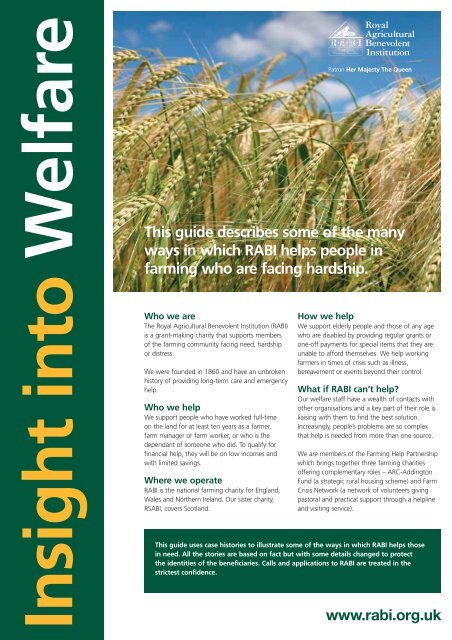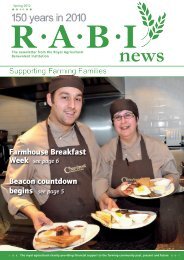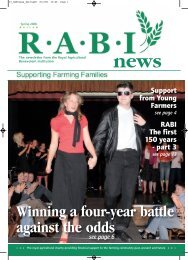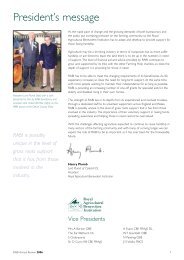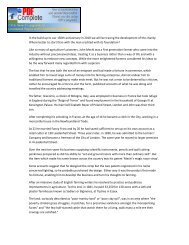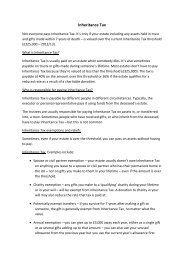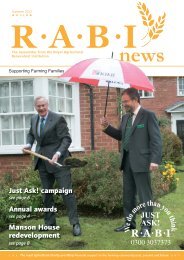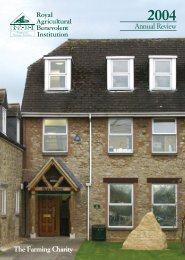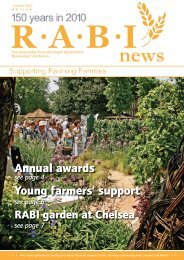Welfare - Royal Agricultural Benevolent Institution
Welfare - Royal Agricultural Benevolent Institution
Welfare - Royal Agricultural Benevolent Institution
- No tags were found...
You also want an ePaper? Increase the reach of your titles
YUMPU automatically turns print PDFs into web optimized ePapers that Google loves.
Insight into <strong>Welfare</strong>This guide describes some of the manyways in which RABI helps people infarming who are facing hardship.Who we areThe <strong>Royal</strong> <strong>Agricultural</strong> <strong>Benevolent</strong> <strong>Institution</strong> (RABI)is a grant-making charity that supports membersof the farming community facing need, hardshipor distress.We were founded in 1860 and have an unbrokenhistory of providing long-term care and emergencyhelp.Who we helpWe support people who have worked full-timeon the land for at least ten years as a farmer,farm manager or farm worker, or who is thedependant of someone who did. To qualify forfinancial help, they will be on low incomes andwith limited savings.Where we operateRABI is the national farming charity for England,Wales and Northern Ireland. Our sister charity,RSABI, covers Scotland.Patron Her Majesty The QueenHow we helpWe support elderly people and those of any agewho are disabled by providing regular grants orone-off payments for special items that they areunable to afford themselves. We help workingfarmers in times of crisis such as illness,bereavement or events beyond their control.What if RABI can’t help?Our welfare staff have a wealth of contacts withother organisations and a key part of their role isliaising with them to find the best solution.Increasingly, people’s problems are so complexthat help is needed from more than one source.We are members of the Farming Help Partnershipwhich brings together three farming charitiesoffering complementary roles – ARC-AddingtonFund (a strategic rural housing scheme) and FarmCrisis Network (a network of volunteers givingpastoral and practical support through a helplineand visiting service).This guide uses case histories to illustrate some of the ways in which RABI helps thosein need. All the stories are based on fact but with some details changed to protectthe identities of the beneficiaries. Calls and applications to RABI are treated in thestrictest confidence.www.rabi.org.uk
2How it works1in5Overall, one in fivepensioners falls belowthe government’smeasure of poverty(National Audit Office)£1.5mWe award grants totallingaround £1.5million eachyear365daysEach year, our welfareteam helps secure statebenefits totalling over£350,000When Essex farmer, John Joseph Mechi foundedRABI in 1860, it was ‘for the relief of farmers,their widows and orphans’.The RABI of today extends much wider and,despite retaining its Victorian name, finds 21stcentury solutions to the problems people facewhen they are suffering hardship through age,disability or in times of crisis.Our national welfare teamAt the heart of our operation is the welfaredepartment, which is based at Shaw House,our head office in Oxford. This is where helplinecalls are taken, initial assessments are made,grants are issued and specialist equipment issourced. Beneficiaries can contact welfare stafffor help and advice at any time.Local supportOur team of regional welfare officers (RWOs) visitnew cases and keep a ‘watching brief’ on existingbeneficiaries in their care. They stay in contact bytelephone and by visiting at least once a year. Intimes of crisis, or when more help is needed,RWOs can respond quickly at local level.The post of RWO was created in 1999 inrecognition that face-to-face contact wouldprovide a more efficient service to beneficiaries.Help at hand – how theprocess startsFor some people, the first step can be the hardest.Farmers are independent, practical people whospend their working lives making things happen.Asking for help is against their nature. It is oftenother people, such as worried friends and family,farming organisations, other charities, socialservices or health professionals, who make thefirst contact.A vicar called our helpline, in confidence,because he was worried about a family in hisparish. With three children to support, oneof whom was disabled, and a farm that wasbringing in very little income, their financeswere stretched to breaking point. Aftergentle persuasion by the vicar, the familyagreed to see our local regional welfareofficer, who immediately identified that thefamily was entitled to state benefits. Hehelped with their claim and their weeklyincome was significantly improved.RABI does not replace the obligation of the stateand all our welfare staff are experts in the statebenefits system. As the first part of the process,they will always check that entitlements are inplace. Their expertise really pays off.Mary, a 78-year old farmer’s widow, hadbeen turned down for pension credit, despitebeing on reduced income. Our regionalwelfare officer calculated that she had a validclaim and contested the decision. The appealwas successful and Mary’s income wasimproved by an extra £26 per week. Imagineher delight, however, when a cheque arrivedfor backdated payments totalling £5,800.The next stepIf the extra income from state benefits is notenough, RWOs will gather the information andevidence needed to support an application foradditional help. Because our commitment to themajority of our beneficiaries is long-term (in reality,this often means for the rest of their lives) theapplication process is necessarily formal and mustbe submitted in writing. RWOs complete theforms and advise head office staff of any otherneeds the applicant might have.To ensure that our support is given to peoplewho are in genuine need, references are requiredfrom an independent professional person, suchas an accountant, bank manager, former employeror NFU official. In emergencies, the applicationprocess can be fast-tracked and if an RWO isunable to visit quickly because of othercommitments, head office staff will take chargeof the case in the meantime.Who decides?Applications are submitted to RABI’s grantscommittee. This is made up of trustees andmeets on average every six weeks. In urgentcases, however, emergency payments can evenbe made the same day.Sam, a retired farm worker, was in hospitalrecovering from a heart attack. Sam’s wifecontacted RABI when the electricity andwater were about to be cut off. Theirhousehold bills had been piling up and theyhad no means to pay them on their limitedincome. The RWO made an initial assessmentand head office staff arranged an emergencygrant to cover the bills. Because of their lowincome and no savings, the couple wereaccepted as long-term beneficiaries at thenext meeting of the grants committee andthey now receive regular help.Summary• Contact made with head office via helpline,letter, fax or email• RWO informed and visit arranged• State benefits entitlements calculated• Application completed and processed• Emergency help given without delay• Consideration by grants committee
3<strong>Welfare</strong> delivery1960A farmer’s widow, aged104, has been an RABIbeneficiary for 47 years80+The over 80s age groupis the most rapidlygrowing section ofthe rural population(Defra)£200k
WellbeingQ&A4HampersEssentials, not luxuries. At Christmas, around 1,200 RABIbeneficiaries receive hampers containing essential storecupboardingredients that they can fall back on over thefestive period and winter months. We remember ourbeneficiaries on their birthdays by sending them a hamperor flowers.HolidaysEach year, around 40 elderly or disabled beneficiaries, withcarers if required, go on a week-long break at a suitablyequipped hotel. The week costs around £500 per personand for some, it is the first holiday they have ever had.HomesWe own and manage two residential homes, in Suffolkand Somerset respectively.Manson House, SuffolkClose to the town centre in the historic market town of BurySt Edmunds is Manson House, a Grade 2 listed buildingwith 22 ensuite rooms and 19 sheltered flats in the grounds.Beaufort House, SomersetBeaufort House is a former school, set in two acres oflandscaped grounds, a short distance from the sea frontin Burnham-on-Sea and offers 28 ensuite rooms and 17sheltered flats.The care provided in our residential homes is exceptional.Each home organises a regular programme of activities andholds annual events to encourage the residents to lead activelives wherever possible.Respite care is also available, subject to availability of rooms.Q: Will you pass my details toanyone else?A: All approaches to RABI are treatedin the strictest confidence and will notbe shared with third parties. In orderto sort out problems, however, wewill gain the permission of the applicantto contact Department of Work &Pensions, creditors or others ontheir behalf.Q: I have seen real cases publicised.Does this not breach confidentiality?A: We only use stories that peoplewant us to tell, to encourage others inthe same position to seek help.Q: Why doesn’t RABI pay businessbills?A: Under our current rules, we are onlyallowed to help with domestic costs.Q: Why can’t I contact my localRWO direct?A: It is important for our present andfuture planning that we have a centralpoint for monitoring requests for helpand where they come from. Secondly,RWOs work part-time and go outvisiting beneficiaries. This means theyare not always available to answerqueries. Head office staff are fullyinformed and can respond quicklyat any time.Q: My elderly relative needsresidential care, which she is ableto fund herself. Are RABI’s tworesidential homes only availablefor beneficiaries?A. As long as rooms are available,our homes will welcome people ofindependent means.Q: Does RABI award educationalgrants?A: Not at this stage, but we can pointpeople in the right direction, so it is stillworth calling us.Q: I referred a case to you and itwas turned down. Why?A: People we help must conform toour criteria and applications containdetailed information about theapplicant’s financial situation, so thatwe can assess their eligibility. We willnot disclose our findings in order toprotect the individual.Q: I am self-employed. Does thatmean I won’t qualify for statebenefits?A: No. You may be just as entitledas anyone else. Self-employment doesnot preclude you from claiming.Q: My mother was a Land Girl butshe only farmed during the war.Might she qualify for RABI help?A: In cases of hardship and where thereis no other benevolent fund that wouldtake precedence over RABI, we are ableto assist those who served in theWomen’s Land Army.Q: My work brings me into contactwith elderly people. May I hold astock of your application forms?A: We will always issue forms fromour head office direct to the applicantso that we can monitor requests and,depending on the individual’scircumstances, send one of our RWOsto visit. We always, however, welcomereferrals.Q: My late husband was a farmworker but I worked at the localschool. Do I still qualify for help?A: Under certain circumstances, RABIcan help family members, even if theyworked outside farming. We might,with the applicant’s permission, requesta contribution from another charitylinked with that profession if one exists.Q: I used to work in farming buthad to leave the industry. Might Istill be eligible?A: Each case is viewed on its meritsand providing our criteria are met,help may be possible.Q: Will my state benefits bereduced if I receive regular grantsfrom RABI?A: No. Charitable grants are fullydisregarded when calculating benefitsentitlements. State benefits will notbe affected.Q: Won’t a grant from RABIdisappear in overdraft charges?A: In special circumstances we canarrange for an emergency cashpayment (by secure means) to ensurethat the money will reach where itis needed.
5 Meet the peopleThe welfare teamThere is no substitute for personal contact todetermine the true extent of people’s problemsand how best to help. The welfare department isheaded by Trish Pickford, assisted by her welfaremanagers Christophine Goss, (north) and LynnePowell, (south), who manage the team of 12regional welfare officers (RWOs).Administration assistants, Tricia Barlow and NickyBusby are usually the first point of contact forboth new enquiries and existing beneficiaries andcarry out a wide variety of duties, including liaisingwith outside agencies such as suppliers ofspecialist equipment.Head office staffFrom the left: Tricia Barlow, Nicky Busby,Christophine Goss, Trish Pickford, Lynne Powell.Regional welfare teamJackie CleggCheshire, Lancs, Cumbria,Staffs, MerseysideKate WoodheadSurrey, Sussex, Kent, London,Hants, Isle of Wight, MiddlesexLiz HoareCornwall, DevonJohn BasnettNorthumberland, Durham,Yorks, Derbyshire, Tyne & WearSara GarnerLeics, Warks, Northants, Beds,Herts, Bucks, West Midlands,NottsPeter AddingtonAvon, Berks, Dorset, Oxon,Wilts, Somerset, South GlosMary HumphreysEssex, Cambs, Suffolk, NorfolkEllen O’KaneNorthern IrelandMeriel EdwardsCarmarthenshire, Ceredigion,PembrokeMel JonesAnglesey, Gwynedd, Conwy,Denbigh & Flint, Wrexham,Shropshire, North PowysClaire CrichardSouth Powys, Glamorgan,Monmouth, Worcs, Herefords,North GlosJill LineLincolnshireRegional welfare teamFrom the left: Jackie Clegg, Kate Woodhead, Liz Hoare, John Basnett, Sara Garner, Peter Addington,Mary Humphreys, Ellen O’Kane, Meriel Edwards, Mel Jones,Claire Crichard and Jill Line.How times changeIn the early days of RABI’s almost 150-year history,receiving support was, quite literally, a lottery.Applicants needed a champion, a respectedmember of society who would vouch for themat the annual general meeting, the only occasionin the year when cases were considered. Themeeting was held in London and applicationswere put to a vote. Those with the lowest voteswould have to wait a further year to try again.RABI’s welfare processes have evolved over theyears in response to the changes both in societyand in the farming industry. In the late 1990s,when farming was facing crisis after crisis – BSE,swine fever, low farm-gate prices, our helpline wasestablished and calls for help grew dramatically.To ease the burden on our head office staff,and to produce a more local service to both newapplicants and existing beneficiaries, a team ofeight regional welfare officers was appointed.Then the foot and mouth epidemic struck. Ouremergency helpline received 300 calls a day atthe height of the crisis and was manned dayand night. The number of new cases reachedan unprecedented scale and two more officerswere recruited, along with additional staff athead office. The regional team now totalstwelve officers.
6 Quick reference guideHow to contact RABIBy telephone:Helpline – 01865 727888General enquiries – 01865 724931By fax: 01865 202025By email: <strong>Welfare</strong> enquiries –welfare@rabi.org.ukGeneral enquiries –info@rabi.org.ukBy post: RABI, Shaw House,27 West Way, Oxford OX2 0QHWebsite: www.rabi.org.ukRegistered charity no 208858Useful contactsFarming HelpHelpline – 07002 326 326Website –www.farminghelp.org.ukRSABIGeneral enquiries –0131 472 4166Website – www.rsabi.org.ukRegular helpWho qualifies?• People who have worked full-time on the landfor at least 10 years in a farming role• They should be fully retired due to age orpermanent disability or ill-health, with nobusiness interests• And will have no more than £8,000 in savingsWhat do they receive?• Regular grants• Special seasonal bonuses• Telephone and lifeline alarm rental charges• Assistance towards the cost of home help orresidential care home fees• A visit by their regional welfare officer at leastonce a year• Christmas and birthday hampers of flowersOne-off helpWho qualifies?• Long-term beneficiaries who cannot pay foressential items or disability aids• Retired people who do not qualify for regularhelp because they can manage their everydayneeds, but lack the funds to cope withunexpected costs• People of any age who are disabled or have along-term illness who, similarly, have insufficientsavings to pay for extra expenses but managewell on a day to day basisWhat do they receive?• Replacement household goods• Disability aids• Help towards unexpected domestic expensesWorking farmersWhat are the criteria for farmers who arestill working?• Applicants will show that they are experiencingexceptional difficulties such as bereavement orill health in addition to financial problems• When events occur beyond their control suchas flooding, outbreaks of animal disease oranother disaster that is causing hardshipWhat do they receive?• Temporary help on the farm when a farmer ormember of the immediate family is takenseriously ill or suffers an accident• One-off help with domestic expenses in timesof crisis• Access to state benefits advice• Guidance on other sources of supportWhere our money comes fromNone of the support we give to ourbeneficiaries would be possible withoutthe generosity of our donors.The mainstay of our fundraising is our networkof 500-plus volunteers, organised into countycommittees, who give up their time to raise fundsand awareness for RABI. They are our ‘eyes andears’, often members of the farming communitythemselves who are well placed to understand thechallenges facing those whose livelihoods dependon what can be such a precarious industry.Our regional fundraising, marketing andcommunications team supports our volunteers,organises local events and campaigns, attendsagricultural shows and liaises with outsideagencies who might come into contact withpeople facing hardship.Nationally, we organise a number of activitiesincluding sporting events, overseas challenges,and awareness campaigns.Legacies, in memoria donations, support fromindividuals and organisations, grants fromcharitable trusts and church collections all makea significant contribution to our voluntary income.Without them, RABI would have been unable tosupport the many thousands of people in needover the course of its long, unbroken history.We are very grateful to the NFU MutualCharitable Trust for their support in theproduction of this publication.


